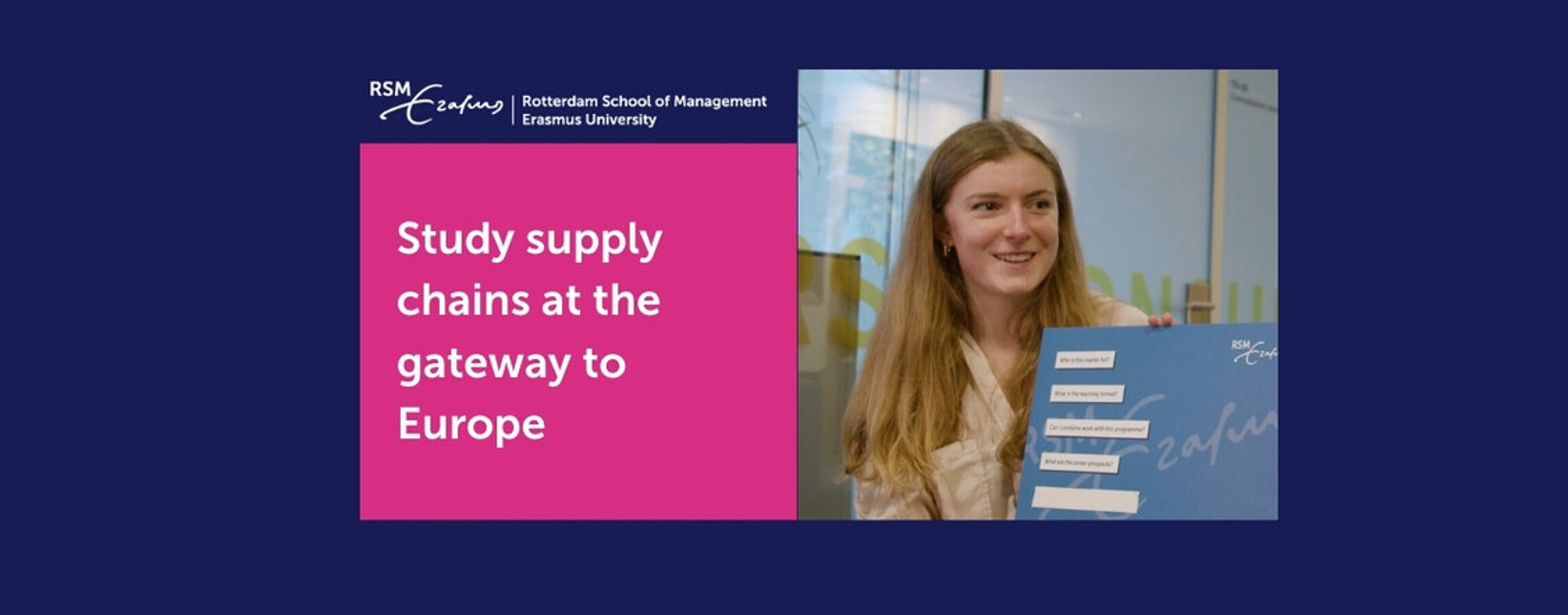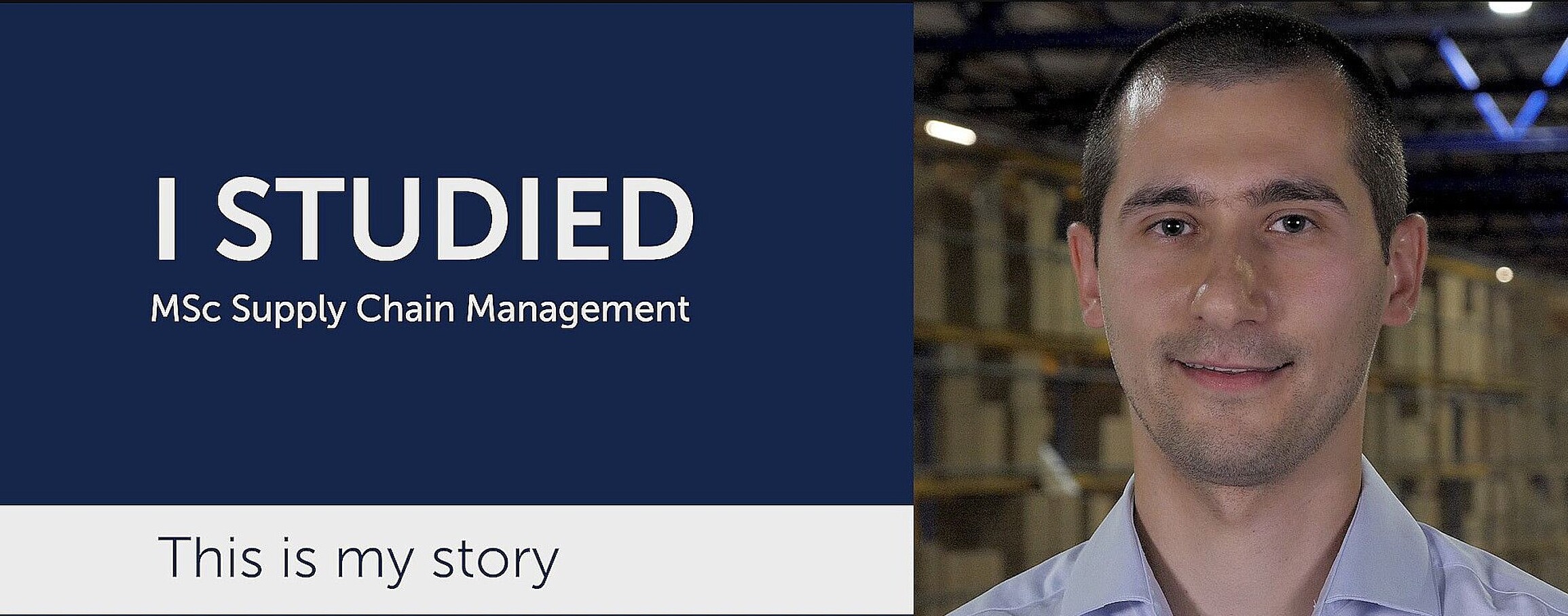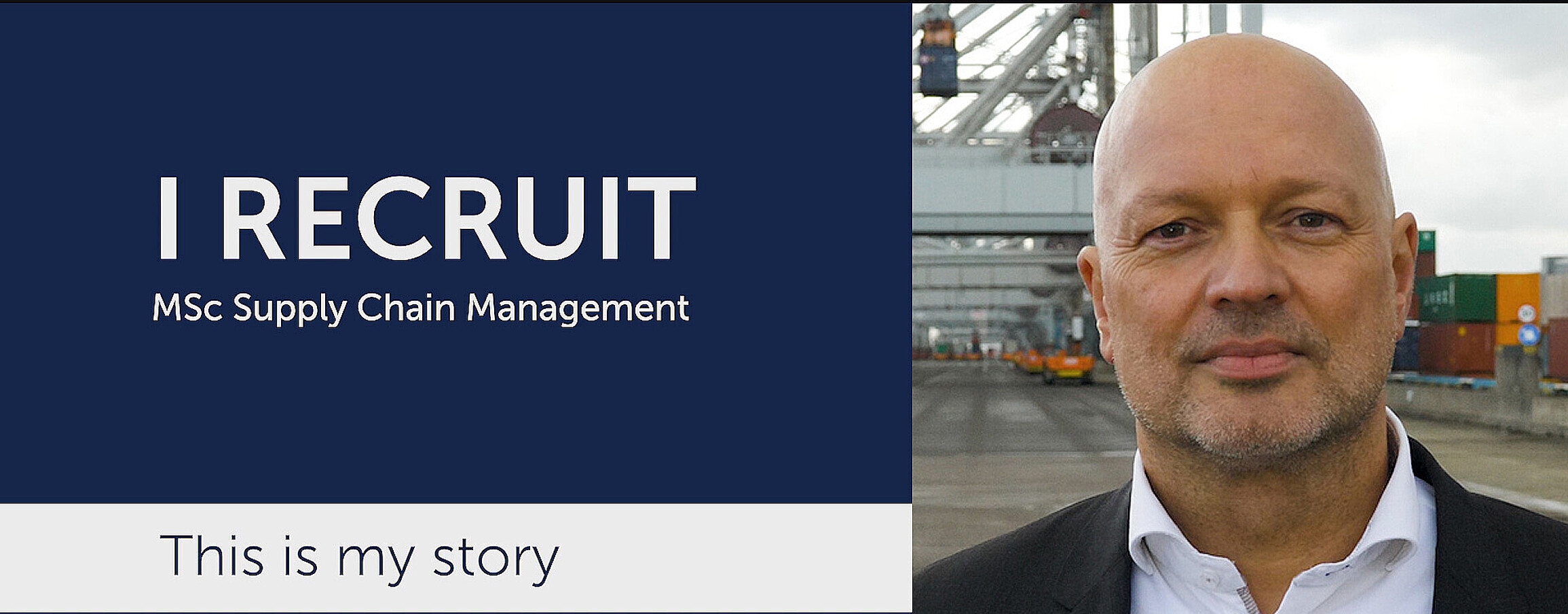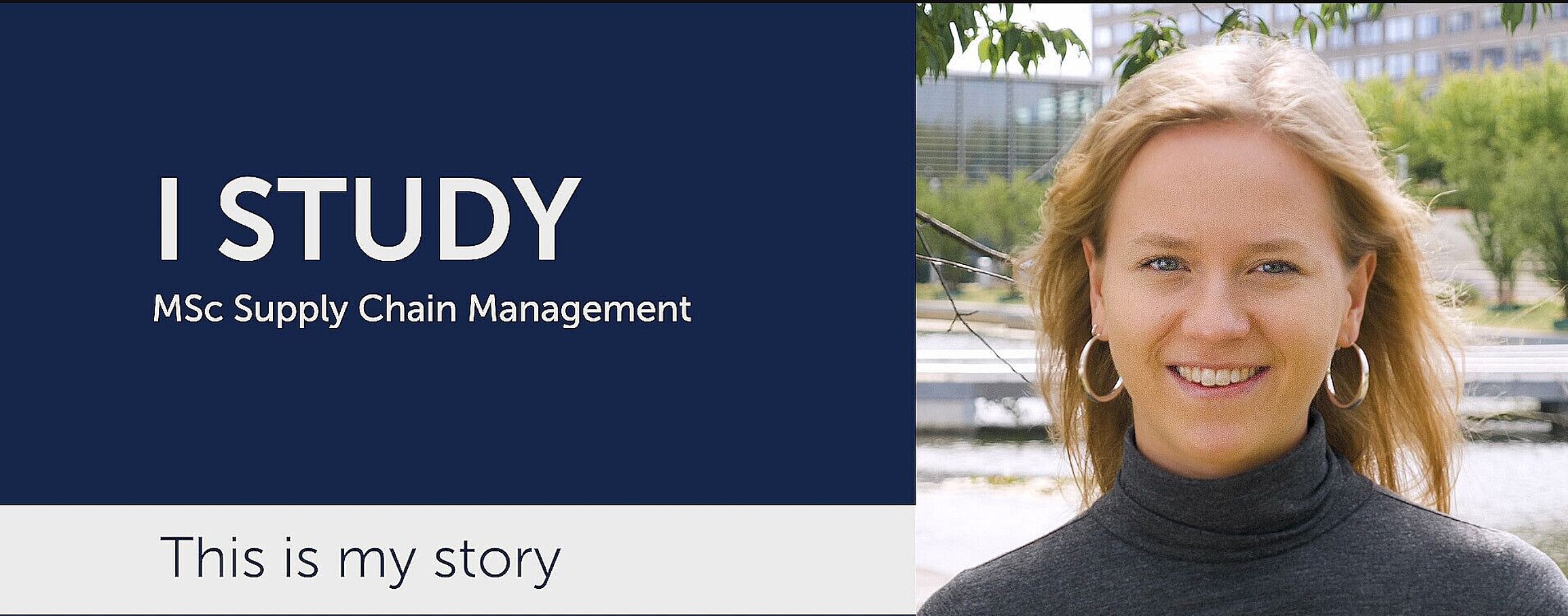Do you want to know more about the MSc in Supply Chain Management?
The video below will answer the most frequently asked questions about the programme.
RSM’s MSc in Supply Chain Management programme is one academic year. Core courses are compulsory and will be offered during the autumn semester (26 ECTS). Master electives (18 ECTS) are offered during the spring semester, of which one elective can be chosen from another MSc programme. It is also possible to replace one elective with an internship or business project. During the year, students work on a master thesis project (16 ECTS).
Our curriculum’s range of topics cover a lot of knowledge. Courses include lectures and workshops, and there’s a high workload. All core courses in blocks 1 and 2 also require extensive teamwork.
MSc programmes are often associated with a research group, guided by accomplished researchers making meaningful contributions in their respective fields. For a closer look at the exciting research initiatives by our academic faculty, we encourage you to explore the department of Technology and Operations Management under which the MSc Supply Chain Management falls.
Please note that core courses and electives are subject to change each academic year. While some electives are very popular and we can place most students in the elective(s) of their choice, there are no guaranteed places.
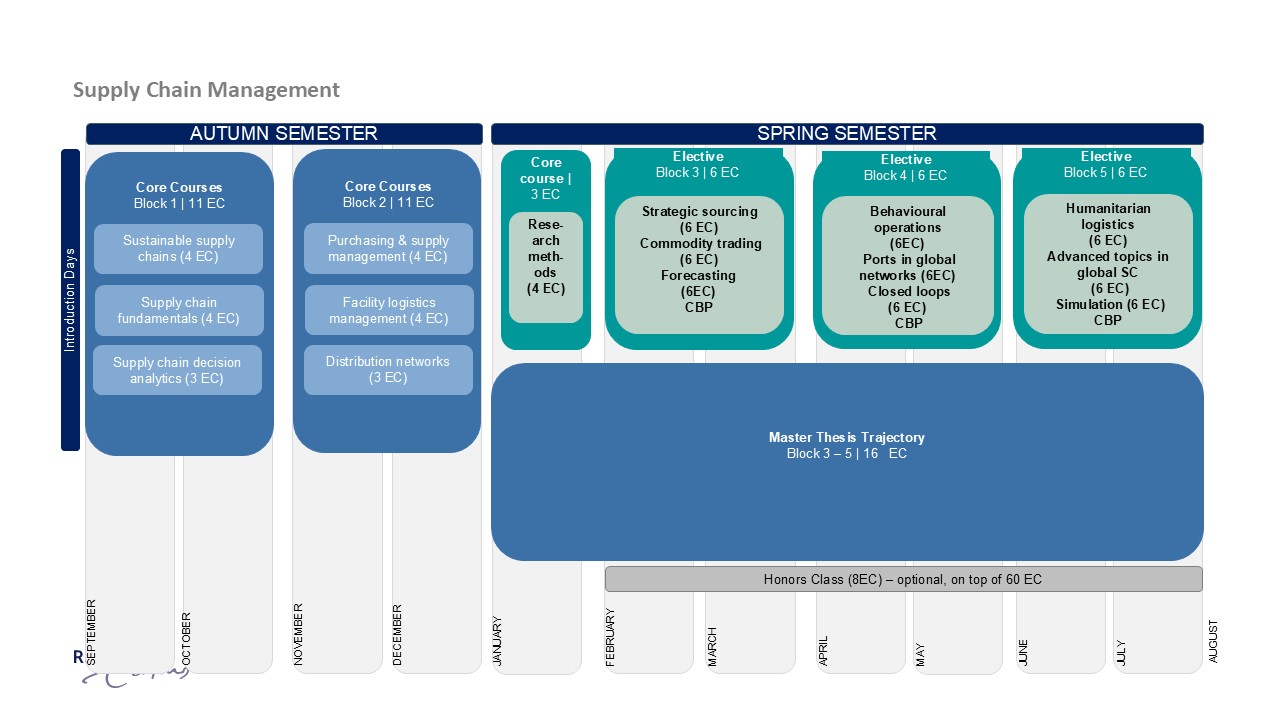
- Supply chain fundamentals
- sustainable supply chains
- purchasing and supply management
- facility logistics management
- distribution networks.
The two methodological courses are offered in Block 1 and in January:
You can choose three elective* courses in parallel to your master thesis trajectory. Each elective course is 6 ECTS and requires a 24-hour workload per week. In most elective courses, you’ll interact with companies, for example in company visits, consultancy-like projects, and exciting guest lectures.
The electives can be grouped into three topic domains so you can customise the second semester to fit your interests.
1. Analytics and data science
- supply chain forecasting
- supply chain simulation
- behavioural operations management
2. Global sourcing and trade
- commodity trade and supply networks
- strategic sourcing
- ports in global networks
3. People, planet and profit
- closed-loop supply chains
- health and humanitarian logistics
All topic domains can include a company-based project.
For a detailed description of all of the courses including electives, please view the course catalogue (for reference only, catalogue continually updated throughout the year).
*Please note that certain electives may be very popular. Although we can place most students in the elective(s) of their choice, there are no guaranteed places.
In the first phase of the thesis trajectory, you find a research topic and a supervisory team. The programme offers a wide array of themes and coach profiles for you to work with. Each research theme offers a broad research area, flexible enough to allow you to specify and investigate your own research questions. The themes typically also provide a set of specific topics and potential research avenues. Different themes require different research approaches. The research themes are as following:
- operations, scheduling and distribution networks
- material handling and facility logistics
- purchasing and supply management
- supply chain forecasting and analytics
- global sustainable supply chains and smart ports
- behavioural operations.
Generally, there are two types of master thesis projects:
- Theory-oriented projects: aim to contribute to theory development or theory testing. Usually, empirical data is used to build or test theory, or to validate the research framework.
- Practice-oriented projects: aim to contribute to the knowledge or to help solve a problem of a practitioner. Usually this is combined with an internship at the practitioner via a so-called ‘company-based project’ (CBP).
Learn more
The best performing and most highly motivated students may be invited to take part in the Supply Chain Management Honours programme. This part of the programme is on top of the regular one-year MSc in Supply Chain Management, and includes two additional courses so the honours students can further broaden and deepen – and demonstrate – their knowledge. They will apply it to a company-based project at one of RSM’s partners.
Selection criteria
Students can only apply for the honours class if they are among the top performing students. The grades of the core courses are taken into account as well as their motivation to follow the class
Recognition
When the student has successfully completed the honours class and graduated, they will receive a certificate indicating the additional EC achieved.
If you have any questions about the honours class please contact the co-ordinator Celia Onsurbe Castellanos.
You can get a taste of working life – from large multinationals to fast-growing start-ups – by applying your new wealth of knowledge to a real company problem during your internship, which is optional in your programme. The RSM Career Centre will support you in finding a suitable position. Many students acquire their first job after graduation from the contacts they make during their internship.
Explore the world and broaden your study experiences by going on international study trips and exchanges at other top schools. RSM has an extensive partner school network of more than 100 business schools and universities worldwide, including top business schools such as ESADE in Barcelona and The Wharton School in the USA. An international exchange is an optional element after you’ve studied for your master for at least one year.
All of our graduates start their career with an outstanding qualification in logistics, supply chain management and operations, and subsequently enjoy premium prospects for coveted positions in international business. Many of them find positions within multinational firms and organisations, partially thanks to relationships they have developed with representatives from the world of business – as well as peers – during the programme’s corporate and other networking events.
Job titles of alumni from the SCM master include:
- Supply chain manager
- Distribution manager
- Warehouse manager
- Operations manager
- Production planning
- Inventory manager
- Sourcing/procurement/purchasing manager
- Logistics information systems manager
You can find employment in a vast number of private, public or non-profit organisations in any sector. All companies, including service-oriented and non-profit organisations, operate supply chains and have value-adding processes which need continuous improvement. The job market in logistics is relatively insensitive to the state of the economy. In recessions, processes must be redesigned to improve efficiency and competitiveness. In economic booms, processes must be adapted to create new opportunities and beat the competition.
Many headhunting companies have a specialist division for operations and logistics. You can also consult the RSM Career Centre to guide you in your search for an internship or job.
Curious to see what our alumni are doing?
Good to know
Non-EEA nationals who have earned a diploma from a higher education institute in the Netherlands can apply for a special residence permit called the orientation year after completing their studies. The 'Orientation Year for Graduates Seeking Employment' is a residence permit aimed at retaining foreign talent for the Dutch labour market. During this orientation year you are free to work without a work permit. Participants who find a job during this period can change their orientation year into a residence permit for Highly Skilled Migrants under more favourable terms.
For the most up-to-date information please visit the following website.
What's next after your studies? The RSM Career Centre is your guide for an impactful career. Its expertise in the labour market, personal branding and connections with employers will prepare you for your business career. Get ready for some exciting job fairs, workshops, speed interviews and coaching. You may land your first internship or job before you even graduate!
You’re a member of the RSM community from Day 1. After you graduate, you’ll also be a member of the RSM alumni network. The countless benefits include networking events worldwide with local chapters, lifelong learning and professional development, mentoring opportunities and access to the latest business knowledge and research. Your study at RSM is the first step towards being part of this inspiring community that you’ll be part of forever.
Talk to our current students!
The 2025-2026 tuition fee for the MSc programmes is approximately €24,600 for non-EEA students. The Dutch government contributes towards this cost for students who hold a nationality from a country belonging to the European Economic Area (EEA). These students therefore only pay the statutory fee €2,601 in 2025-2026.
For EEA nationals who have already completed a master in the Netherlands (and obtained the diploma) the tuition fee for a 2nd master is approximately €14,400.
Please note that all these tuition fee tariffs are subject to change.
There are other costs associated with the Master programmes, for more information please review the “Other expenses” section below thoroughly.
Scholarships
The number of scholarships is limited and mainly merit based. If a scholarship covers only the tuition fees, be aware that you need to finance your own living expenses (rent, food and insurances) for the duration of your studies. RSM does not offer scholarships for the pre-master programme. We do however offer a maximum of 2 scholarships per academic year to RSM pre-master students enrolling in an MSc programme.
Rotterdam School of Management, Erasmus University (RSM) offers multiple scholarships to prospective students from non-EEA countries who are not entitled to pay the EEA tuition fee, provided their grades are considered ‘excellent’. RSM also offers one scholarship, the Erasmus Trustfonds Scholarship, to students from EEA countries.
Besides scholarships awarded by RSM, there are also scholarships awarded by the Dutch government or other organisations that are available if you meet certain criteria such as nationality, age, etc We have listed some of them below but we encourage you to use resources such as Grantfinder or the Scholarship Portal to find additional scholarships.
- StuNed
- G&D Europe Scholarship
- NN Future Matters Scholarship
- Russia: The Global Education Programme
- LPDP
- OKP
Scholarship tips
- Contact the Ministry for Higher Education in your home country to see whether there are scholarship options.
- We have virtual information session covering all you need to know about scholarships and financial aid. Watch it here.
For students from the Netherlands or the EU/EEA, it may be possible to apply for limited funding towards payment of your tuition fees. Find out whether you meet the nationality and age requirements and read more information about the application process here.
IM/CEMS is a program that - if you are still eligible - entitles you to a maximum of 1 year's use of your DUO entitlements. Students who have received a basic grant and possibly a supplementary grant from DUO in the first year of IM/CEMS and meet the following additional conditions may be eligible for an additional half year (6 months) of financial support, which is equal to the grant received in the last month during the program. Please contact the student counselors for more information.
Conditions Financial Support Fund
Students eligible for financial support due to extended master programmes are those who:
a) are enrolled full-time in a public funded Erasmus University Rotterdam degree programme, which is extended on the base of article 7.4, paragraph 8 of the Dutch Higher Education and Research Act;
b) are enrolled as first enrollment (hoofdinschrijving) in the study programme as referred to under a, for which the student pays statutory tuition fee;
c) for this program, is or was entitled to study finance (prestatiebeurs hoger onderwijs) as referred to in the Wet Studiefinanciering 2000, and during the period corresponding to the study load that exceeds 60 ECs, and is no longer eligible for student finance in the form of an additional grant.
Other expenses
After having filled in all of the necessary application information on the Online Application Form (OLAF) and uploaded the required documents, applicants with a degree obtained outside the Netherlands will be asked to pay a non-refundable €100 handling fee. This fee can be paid online via the Erasmus Payment System which uses either iDEAL (for those with a Dutch bank account) or PayPal (which can be linked to any bank account or credit card worldwide). It is important that applicants complete the payment process as indicated, otherwise the system cannot register the payment.
The additional expenses in addition to tuition and general living costs (see below) vary per programme and may include:
- Study materials such as books, readers and business cases
- Costs involved in kick-off meetings
- Costs related to travel, international excursions and compulsory exchange semesters or internships abroad
Approximately € 300 - 500 (per year), these costs differ per programme.
For a reasonable standard of living in the Netherlands, you should have an income of between €1,235-€1,735 per month depending on your lifestyle. Further information about the costs of living in the Netherlands and related subjects can be found on this website. Below is an example of monthly expenditures:
| Furnished accommodation, including gas and electricity | € 500-1,000 |
| Medical insurance | € 50 |
| Telephone/internet | € 15-40 |
| Food | € 300 |
| Books, recreation, clothing | € 300 |
| Public Transportation | € 50 |
| Total | € average 1235 - 1735 |
| Other potential expenses: | |
| Buying or renting a bike | € 100 - 250 (per year) |
| In private residence (not student housing) yearly municipal and water taxes | € 100 - 300 (per year) |
| Study trip or other study related travel | € 300 - 500 (per year) |
Please ensure, prior to your arrival at RSM, that you have or will have sufficient funding available to finance your stay at RSM. Finding a part-time job, may be an option, but can not be guaranteed. You should therefore not rely on finding other ways to supplement your income during your studies. For additional information on obtaining a part-time job, visit the website of the Nuffic.
For EEA students there are no formal restrictions in finding work in the Netherlands, but students with a lack of Dutch language skills will find it difficult to secure employment. Non-EEA students are subject to labour regulations, which makes the likelihood of obtaining a work permit very small. We therefore ask students not to rely on this possibility. We do not encourage students to combine studies with the heavy workload from a part-time job.
Application opens 1 October. This is a capped programme which means that the application will close either when the maximum number of applications (300*) has been reached or 15 May, whichever comes first. *Subject to change.
Find out everything you need to know about entry visas & residence permits for non-EU or EEA students at RSM.
Finding housing in Rotterdam can be tricky. To help you in your search for housing, we have compiled some helpful resources


